3Com WL-605, WL-604 User Manual

Quick Start Guide
3Com® AirConnect® 9550
11n 2.4+5GHz PoE Access Point
3CRWE955075 / WL-605
3Com® AirConnect® 9150 11n 2.4GHz PoE Access Point
3CRWE915075 / WL-604
Guide de mise en route…11
Français
Guida introduttiva…21
Italiano
Kurzanleitung…31
Deutsch
Guía de inicio rápido…41
Español
Guia de Início Rápido…51
Portuguese
Part Number 10016854 Rev. AA
Published May 2008
Copyright © 2008, 3Com Corporation. All rights reserved. No part of this documentation may be reproduced in any form or by any means or used to make any derivative work (such as translation, transformation, or adaptation) without written permission from 3Com Corporation.
3Com Corporation reserves the right to revise this documentation and to make changes in content from time to time without obligation on the part of 3Com Corporation to provide notification of such revision or change.
3Com Corporation provides this documentation without warranty, term, or condition of any kind, either implied or expressed, including, but not limited to, the implied warranties, terms, or conditions of merchantability, satisfactory quality, and fitness for a particular purpose. 3Com may make improvements or changes in the product(s) and/or the program(s) described in this documentation at any time.
If there is any software on removable media described in this documentation, it is furnished under a license agreement included with the product as a separate document, in the hardcopy documentation, or on the removable media in a directory file named LICENSE.TXT or !LICENSE.TXT. If you are unable to locate a copy, please contact 3Com and a copy will be provided to you.
UNITED STATES GOVERNMENT LEGENDS:
If you are a United States government agency, then this documentation and the software described herein are provided to you subject to the following:
United States Government Legend: All technical data and computer software is commercial in nature and developed solely at private expense. Software is delivered as Commercial Computer Software as defined in DFARS 252.227-7014 (June 1995) or as a commercial item as defined in FAR 2.101(a) and as such is provided with only such rights as are provided in 3Com’s standard commercial license for the Software. Technical data is provided with limited rights only as provided in DFAR 252.227-7015 (Nov 1995) or FAR 52.227-14 (June 1987), whichever is applicable. You agree not to remove or deface any portion of any legend provided on any licensed program or documentation contained in, or delivered to you in conjunction with guide.
Unless otherwise indicated, 3Com registered trademarks are registered in the United States and may or may not be registered in other countries.
3Com, the 3Com logo, and AirConnect are registered trademarks of 3Com Corporation.
Microsoft and Windows are either registered trademarks or trademarks of Microsoft Corporation in the United States and/or other countries. Oracle is a registered trademark of Oracle Corporation.
All other company, brand, and product names may be registered trademarks or trademarks of the respective companies with which they are associated.

Quick Start Guide
3Com® AirConnect® 9550
11n 2.4+5GHz PoE Access Point
3CRWE955075 / WL-605
3Com® AirConnect®
9150 11n 2.4GHz PoE Access Point
3CRWE915075 / WL-604
This Quick Start Guide describes the basic steps necessary to install and configure your 3Com AirConnect 9550 11n 2.4+5GHz PoE Access Point and 3Com AirConnect 9150 11n 2.4GHz PoE Access Point. Note: This guide refers to these devices as the Access Point or AP.
Before you install or move the AP, you must carefully read the safety information provided in “Safety Information” on page 3 of this manual.
About This Guide
This guide describes the basic installation of the AP. It covers these topics:
•AP Features
•Register Your Product for Services and Repair
•Safety Information
•1: Unpacking the AP
•2: Preparing for Installation
•3: Mounting the AP
•4: Connecting Power
•5: Checking the LED Indicators
•6: Installing Software
•7: Connecting to the AP
•8: Configuring the AP
•Troubleshooting
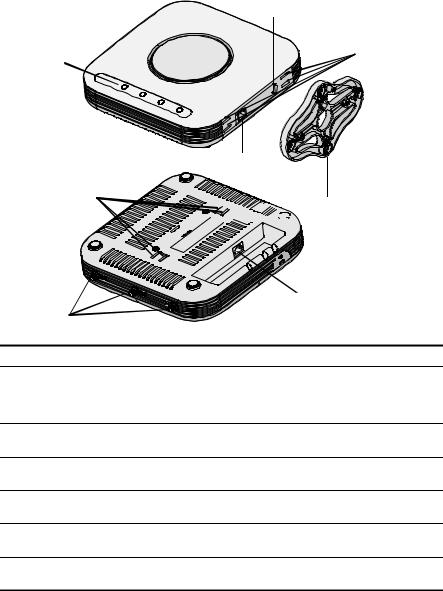
AP Features
Reset Button
Slots for desktop mounting
LEDs
RJ-45 Console Port
Slots for wall
mounting 













 Wall Mounting Bracket/
Wall Mounting Bracket/ 








 Table Top Stand
Table Top Stand
|
Ethernet Port |
Connectors for optional antennas |
|
Feature |
Description |
Ethernet Port |
The Ethernet port provides a 10/100/1000 BASE-T Ethernet connection |
|
to a switch. Use a suitable Category 5 cable with straight-through |
|
wiring and standard RJ-45 connectors to connect your AP to the |
|
network. |
LEDs |
The LEDs indicate power and activity. See “Checking the LED |
|
Indicators” on page 8 for details. |
Antenna Connectors |
The AP has three built-in internal antennas. In addition, three RSMA |
|
antenna connectors allow you to connect optional external antennas. |
Reset Button |
To restore factory settings, during power-up, press the Reset button and |
|
hold it for 5 or more seconds. |
RJ-45 Console Port |
Provides a serial interface to the AP for diagnostic use. Default: 115.2K |
|
speed, 8 bits, no parity, 1 stop bit. |
Wall-Mounting Bracket |
The combined wall-mounting bracket and table-top stand allows you to |
and Table-Top Stand |
mount the unit on a wall or stand it on a table top. |
2

Register Your Product for Services and Repair
To obtain telephone support as part of your warranty and other service benefits, you must first register your product at:
http://eSupport.3com.com/
Telephone Technical Support and Repair
3Com offers telephone, e-mail, and Internet access to technical support and repair services. To access these services for your region, use the appropriate telephone number, URL, or e-mail address from the following URL:
http://csoweb4.3com.com/contactus/
Safety Information
This equipment must be installed in compliance with local and national building codes, regulatory restrictions, and FCC rules. For the safety of people and equipment, only professional network personnel should install the AP.
WARNING: Warnings contain directions that you must follow for your personal safety. Follow all directions carefully.
You must read the following safety information carefully before you install or remove the unit.
WARNING: Exceptional care must be taken during installation and removal of the unit.
WARNING: This unit operates under SELV (Safety Extra Low Voltage) conditions according to IEC 950 / IEC 60950. The conditions are only maintained if the equipment to which it is connected also operates under SELV conditions.
WARNING: There are no user-replaceable fuses or user-serviceable parts inside the unit. If you have a physical problem with the unit that cannot be solved with problem solving actions in this guide, contact your supplier.
WARNING: RJ-45 ports. These are RJ-45 data sockets. They cannot be used as standard traditional telephone sockets, or to connect the unit to a traditional PBX or public telephone network. Only connect RJ-45 data connectors, network telephony systems, or network telephones to these sockets.
Either shielded or unshielded data cables with shielded or unshielded jacks can be connected to these data sockets.
WARNING: To comply with FCC radio frequency (RF) exposure limits, a minimum body-to-antenna distance of 20 cm (8 in.) must be maintained when the AP is operational.
Approved Channels
Use of this product is only authorized for the channels approved by each country. For proper installation, select your country from the country-selection list.
To conform to FCC and other country restrictions, your product may be limited in the channels that are available. If other channels are permitted in your country, please visit the 3Com web site for the latest software version:
www.3Com.com
3

1. Unpacking the AP
Make sure that you have the following items, which are included with the AP:
•One 3Com AirConnect 9550 Access Point or 3Com AirConnect 9150 Access Point
•Wall-mounting hardware:
•1 combined wall-mounting bracket and table-top stand
•4 screws
•4 wall anchors
•8 adhesive rubber feet
•1 CD-ROM containing the WIDMan Utility software
•1 copy of this Quick Start Guide
•One 3Com Warranty document
2.Preparing for Installation
3Com recommends that you connect and check the Ethernet cable and LEDs before you install the AP in a hard-to-reach location. Also, observe these items before you mount or connect the AP:
Feature |
Description |
|
|
Switch Port |
To connect your wireless network to your wired network, you need a |
|
switch that is connected to the AP. |
|
|
Cabling |
Make sure that a standard Ethernet cable with straight-through wiring |
|
is installed at the site before you install the AP. |
|
Make sure that the cable is highly flexible and that the RJ-45 connector |
|
has no extra covering that could prevent the cable from being routed |
|
through the mounting bracket. |
|
|
Power Requirement |
Power is supplied using an 802.3af Power Over Ethernet (PoE) |
|
compliant device such as a PoE switch or a PoE injector (also called a |
|
PoE midspan). Example: 3CNJPSE-GIG. For maximum performance, |
|
3Com recommends that you use a Gigabit link. |
|
|
MAC Address |
Record the AP MAC address in a safe place before the AP is installed in |
|
a hard-to-reach location. |
|
The MAC address is printed on the back of the AP. Additional MAC |
|
address labels are shipped with the AP. |
|
|
4
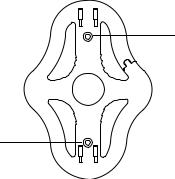
3. Mounting the AP
The AP can be mounted on the following types of surfaces:
•Wall or electrical box (NEMA enclosure)
•Table top
Wall or Electrical Box Mounting
To install your AP on a wall or electrical box, use the mounting bracket that comes with the device. Follow these steps:
1Following these guidelines, screw the mounting bracket to a wall or electrical box (NEMA enclosure):
•The mounting bracket tabs should be pointing upward.
•If mounting to drywall, use the 4 screws and 4 wall anchors.
•If mounting to an EU electrical box (60.3mm), use 2 threaded screws and insert into the holes marked “A” in the diagram shown below.
•If mounting to a US electrical box (83.3mm), use 2 threaded screws and insert into the holes marked “B” in the diagram shown below.
B
A 


 A
A
B
2Connect the Ethernet cable (for power and network connection) to the LAN port on the back of the AP.
3To mount the AP onto the mounting bracket, insert the mounting-bracket tabs into the slots on the back of the AP.
CAUTION: If you are mounting the AP on a wall, you cannot use the slots on the bottom narrow edge of the device. Instead, you must use the slots on back of the AP.
5
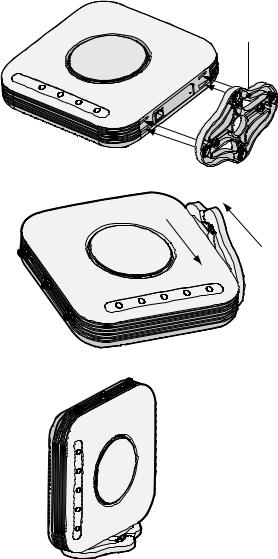
Tabletop Mounting
To install the AP on a flat surface such as a table or desktop, follow these steps:
1Insert the tabs on the table stand into the slots on the side of the AP, as shown in the illustration. Align the cable routing cut out toward the upper part of the stand.
Cable routing cut out
2 To lock the stand to the AP, slide the stand back and the AP forward, as shown here:
3 Place the AP and table stand on the table.
4Connect the Ethernet cable for power and network connection to the LAN port on the back of the AP.
6
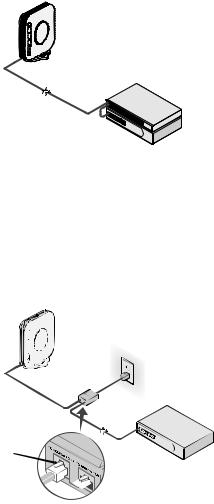
4. Connecting Power
This section describes how to power the AP in either of these ways:
•By Power Over Ethernet (PoE) supplied over the LAN by an 802.3af PoE compliant device such as a switch.
•By PoE supplied by a PoE injector or midspan (not included with the AP).
Power over Ethernet (PoE) from the LAN
To power the AP using PoE provided by a switch or other 802.3af compliant device, plug the network cable from the device into the AP’s Ethernet port.
Access Point
 PoE Switch
PoE Switch
Power over Ethernet from a PoE Injector
To power the AP using a PoE injector or midspan (not included), follow these steps:
1Connect the LAN cable from a switch to the Switch port on the PoE injector. 3Com recommends that you use a Gigabit PoE injector such as 3CNJPSE-GIG
2Connect a LAN cable from the Ethernet port on the AP to the other LAN port on the PoE injector.
3Plug the PoE injector into a properly grounded electric outlet. See the illustration.
Access Point
Switch
(non-PoE)
To Access Point

 To Switch
To Switch
7

5. Checking the LED Indicators
When the AP is connected to power, LEDs indicate activity as follows:
|
|
|
Indicator |
Color |
State |
Description |
|
|
|
LED 1 |
|
Off |
No power |
|
|
|
|
|
|
|
|
|
|
(Power/ |
Amber |
On |
Failure of CPU or system |
|
|
|
System) |
|
Blinking |
System initiation or reset (software self- |
|
|
|
|
|
|
testing and loading) |
|
|
|
|
Green |
On |
Powered on and ready for operation |
|
|
|
|
|
|
|
|
|
|
LED 2 |
Green |
Off |
Radio disabled |
|
|
|
|
|
|
|
|
|
|
(2.4G) |
|
On |
Radio enabled |
|
|
|
|
|
Blinking |
Activity |
|
|
|
|
|
|
|
|
|
|
LED 3 |
Green |
Off |
Radio disabled |
|
|
|
|
|
|
|
|
|
|
(5G) |
|
On |
Radio enabled |
|
|
|
(on the 3Com |
|
Blinking |
Activity |
|
|
|
AirConnect 9550 |
|
|
|
|
|
|
Access Point only) |
|
|
|
|
|
|
|
|
|
|
|
|
|
LED 4 |
|
Off |
No 10/100/1000 BASE-T link detected, or |
|
|
|
(Ethernet) |
|
|
administratively disabled |
|
|
|
|
|
|
|
|
|
|
|
Amber |
On |
10/100 BASE-T link detected; no activity |
|
|
|
|
|
|
|
|
|
|
|
|
Blinking |
10/100 BASE-T link activity |
|
|
|
|
|
|
|
|
|
|
|
Green |
On |
1000 BASE-T link detected; no activity |
|
|
|
|
|
|
|
|
|
|
|
|
Blinking |
1000 BASE-T link activity |
|
|
|
|
|
|
|
6. Installing Software
The following application is included on the 3Com WIDMan Utility CD-ROM:
• Wireless Infrastructure Device Manager (WIDMan Utility)
To discover and configure the AP, you must first install the Wireless Infrastructure Device Manager software (WIDMan) on your computer.
1Turn on your computer.
2Insert the 3Com Installation CD into the CD-ROM drive.
The CD menu appears. If it does not appear, start the Setup menu from the Windows Start menu. For example: Start > Run > d:\autorun.exe
3On the menu, click Install/Uninstall WIDMan.
4On the next screen, double-click 3Com Wireless Infrastructure Device Manager and then click Install. The installation begins.
5Follow the instructions on each screen to complete the installation. If prompted, reboot the computer.
8
7. Connecting to the AP
To connect to the AP, you must first determine the AP’s IP address in one of these ways.
Finding the IP Address on Networks with a DHCP Server
If your network has a DHCP server, it automatically assigns an IP address to the AP. The AP takes between 1 and 2 minutes to detect a DHCP server on the network. Use WIDMan to locate the AP on the network and view its IP address. See “Using the WIDMan Utility”.
Finding the IP Address on Networks Without a DHCP Server
If your network does not have a DHCP server, the AP uses a default factory-assigned IP address (169.254.2.111).
Using the WIDMan Utility
3Com WIDMan (Wireless Infrastructure Device Manager) software lets you discover and configure your AP. Follow these steps to use WIDMan to determine the AP’s IP address.
1Connect the AP to the network.
2Launch WIDMan from the Windows Start menu: Start > Programs > 3Com Wireless > Wireless Infrastructure Device Manager. The Wireless Network Tree screen displays your AP when it is detected.
3Click to select your AP, and then click Properties. Make a note of your AP’s IP address.
4To access the AP’s web interface, select the AP and click Configure or double-click the AP.
8.Configuring the AP
To configure the AP after you determine its IP address, follows these steps:
1Launch your computer’s web browser. In the address bar, enter your AP’s IP address and press Enter.
2At the AP Login Screen, type the user name and password, and then click Log On. The default username and password are case-sensitive:
•Username: admin
•Password: password
3If this is the first time that you are logging onto the AP, you are prompted to select the country in which you will be using the device. Choose your country from the menu and then click Apply.
4To configure your AP, click Setup Wizard in the menu on the left side of the screen.
5Follow the prompts on the screen. Use the Next and Back buttons to move through the screens. Click Finish when you are done.
For details on using the Wireless Infrastructure Device Manager and configuring your AP, see the
3Com AirConnect 9550 11n 2.4+5GHz PoE Access Point / 3Com AirConnect 9150 11n 2.4GHz PoE Access Point User Guide on our website:
http://www.3Com.com
9
9. Troubleshooting
For troubleshooting information please refer to your User's Guide or visit 3Com’s World Wide Web site: http://www.3Com.com.
10

Guide de mise en route
3Com® AirConnect® 9550
Point d'accès PoE 11n 2,4+5 GHz
3CRWE955075 / WL-605
3Com® AirConnect®
Point d'accès PoE 9150 11n 2,4 GHz
3CRWE915075 / WL-604
Le présent guide de mise en route indique la procédure à suivre pour installer et configurer le point d'accès PoE 3Com AirConnect 9550 11n 2,4+5 GHz et le point d'accès PoE 3Com AirConnect 9150 11n 2,4 GHz. Remarque :Ce guide se sert du terme PA (Point d'Accès) pour désigner ces dispositifs.
Avant d'installer ou de déplacer le PA, veuillez lire attentivement les informations relatives à la sécurité présentées dans la section “Informations relatives à la sécurité”, à la page 13 du présent guide.
Présentation de ce guide
Le présent guide décrit les étapes d'installation du PA. Il aborde les sujets suivants :
•Fonctions du PA
•Enregistrement du produit pour le service après vente
•Informations relatives à la sécurité
•1: Déballage du PA
•2: Préparation de l'installation
•3: Montage du PA
•4: Mise sous tension
•5: Vérification des voyants lumineux
•6: Installation du logiciel
•7: Connexion au PA
•8: Configuration du PA
•Dépannage
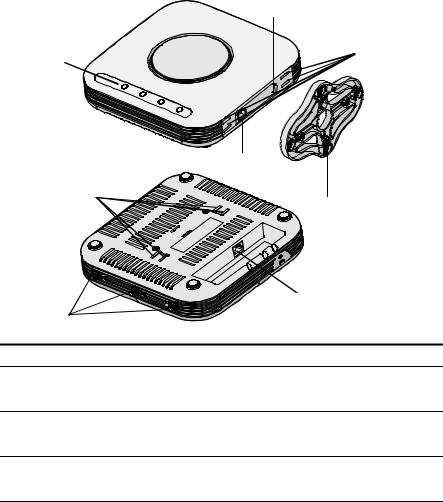
Fonctions du PA
Bouton de réinitialisation
Encoches pour la
fixation au bureau
Voyants
|
Port pour la console RJ45 |
Encoches pour la |
|
fixation au mur |
Attache de montage mural/ |
|
|
|
Socle pour bureau |
|
Port Ethernet |
Connecteurs pour les antennes en option |
|
Fonction |
Description |
Port Ethernet |
Le port Ethernet offre une connexion Ethernet 10/100/1000 BASE-T à |
|
un commutateur. Utilisez un câble droit de catégorie 5 et des |
|
connecteurs RJ45 standard pour relier le PA au réseau. |
Voyants |
Les voyants indiquent si le dispositif est sous tension et si des activités |
|
sont en cours. Reportez-vous à la section “Vérification des voyants |
|
lumineux”, à la page 18 pour plus d'informations. |
Connecteurs d'antenne Le PA dispose de trois antennes intégrées. En outre, trois connecteurs d'antenne RSMA permettent de brancher des antennes externes supplémentaires.
Bouton de |
Permet de rétablir les paramètres d'usine : à la mise sous tension, |
réinitialisation |
maintenez le bouton de réinitialisation appuyé pendant plus de 5 |
|
secondes. |
|
|
Port pour la console |
Ce port fournit une interface série au PA à des fins de diagnostic. Par |
RJ45 |
défaut : vitesse de 115,2K, 8 bits, pas de parité, 1 bit d'arrêt. |
|
|
Attache de montage |
La combinaison attache et socle permet de fixer le dispositif au mur ou |
mural et socle de |
sur une table. |
bureau |
|
|
|
12

Enregistrement du produit pour le service après vente
Pour obtenir l'aide par téléphone dans le cadre de la garantie ainsi que d'autres avantages, vous devez enregistrer votre produit à :
http://eSupport.3com.com/
Soutien technique et réparation par téléphone
3Com offre un accès aux services d'aide technique et de réparation par téléphone, courriel et Internet. Pour accéder à ces services dans votre région, utilisez le numéro de téléphone, l'URL ou l'adresse électronique corrects depuis l'URL suivante :
http://csoweb4.3com.com/contactus/
Informations relatives à la sécurité
Cet équipement doit être installé conformément aux normes de construction locales et nationales, aux restrictions réglementaires et au règlement du FCC. Pour garantir la sécurité des personnes et des équipements, seul le personnel chargé de la gestion du réseau est autorisé à procéder à l'installation du PA.
AVERTISSEMENT : Ces avertissements contiennent des instructions que vous devez impérativement suivre pour votre propre sécurité. Respectez strictement toutes les instructions.
Lisez attentivement les informations de sécurité suivantes avant d'installer ou de désinstaller le dispositif.
AVERTISSEMENT : Faites preuve de la plus grande attention lors des opérations d'installation et de désinstallation de l'unité.
AVERTISSEMENT : Cette unité fonctionne en très basse tension, et respecte les normes IEC 950 / IEC 60950 de la Commission électrotechnique internationale. Ces normes sont respectées uniquement si l'équipement auquel elle est connectée fonctionne également en très basse tension.
AVERTISSEMENT : L'unité ne contient ni fusibles, ni pièces nécessitant un entretien particulier. Si vous rencontrez un problème que vous ne parvenez pas à résoudre en suivant les mesures correctives proposées dans ce guide, contactez votre fournisseur.
AVERTISSEMENT : Ports RJ45. Il s'agit de sockets de données RJ45. Ces sockets ne peuvent en aucun cas être utilisés comme prises de téléphone standard ou pour connecter le dispositif à un autocommutateur privé classique ou un réseau téléphonique public. Branchez uniquement des connecteurs de données RJ45, des systèmes de téléphonie en réseau ou des téléphones en réseau à ces sockets.
Il est possible de brancher des câbles de données blindés ou non blindés équipés de prises blindées ou non blindées à ces sockets de données.
AVERTISSEMENT : Conformément aux dispositions relatives à l'exposition aux radiofréquences du règlement du FCC, il convient de se tenir à une distance minimale de 20 cm de l'antenne lorsque le PA est en fonctionnement.
13

Canaux approuvés
Ce produit peut être utilisé uniquement sur une plage limitée de canaux, propre à chaque pays. Pour assurer une installation correcte, sélectionnez votre pays dans la liste.
En vertu des restrictions du FCC et celles propres à votre pays, il se peut que les canaux disponibles soient limités au niveau de votre produit. Si d'autres canaux sont autorisés dans votre pays, consultez le site Web de 3Com pour obtenir la dernière version du logiciel :
www.3Com.com
1. Déballage du PA
Vérifiez que vous disposez bien des éléments suivants, fournis avec le PA :
•Un point d'accès 3Com AirConnect 9550 ou 3Com AirConnect 9150
•Matériel pour la fixation murale :
•1 ensemble attache murale et socle
•4 vis
•4 chevilles
•8 pieds autocollants en caoutchouc
•1 CD-ROM contenant l'utilitaire WIDMan
•1 copie de ce Guide de mise en route
•Un document de garantie 3Com
2.Préparation de l'installation
3Com recommande de mettre l'équipement sous tension, de vérifier le branchement du câble Ethernet et de s'assurer que les voyants fonctionnent avant d'installer le PA dans un emplacement difficile d'accès. Vérifiez également les points suivants avant de fixer ou de connecter le PA :
Fonction |
Description |
|
|
Port du commutateur |
Pour relier votre réseau sans fil à votre réseau câblé, vous devez |
|
connecter un commutateur au PA. |
|
|
Câblage |
Vérifiez que le site est équipé d'un câble droit Ethernet standard avant |
|
d'installer le PA. |
|
Assurez-vous qu'il s'agit d'un câble très souple et que le connecteur |
|
RJ45 passe sans encombre dans l'encoche de l'attache. |
|
|
Alimentation |
L'alimentation est assurée par un appareil PoE de norme 802.3af tel |
|
qu'un commutateur PoE ou un injecteur PoE (également appelé |
|
midspan PoE). Exemple : 3CNJPSE-GIG. Pour des performances |
|
optimales, 3Com préconise l'utilisation d'un lien gigabit. |
|
|
Adresse MAC |
Notez l'adresse MAC du PA pour référence ultérieure avant d'installer |
|
le PA dans un emplacement difficile d'accès. |
|
Cette adresse MAC est imprimée à l'arrière du PA. Des étiquettes sur |
|
lesquelles figure l'adresse MAC sont fournies avec le PA. |
|
|
14

3. Montage du PA
Vous pouvez installer le PA sur plusieurs types de surface :
•Mur ou coffret de branchement normalisé
•Dessus de table
Fixation au mur ou à un coffret de branchement
Pour monter le PA sur un mur ou à coffret de branchement, servez-vous de l'attache fournie avec le dispositif. Procédez comme suit :
1Pour visser l'attache au mur ou au coffret de branchement normalisé :
•Les pattes de l'attache doivent se trouver vers le haut.
•En cas de montage sur cloison sèche, utilisez les 4 vis et les 4 chevilles.
•En cas de montage à un coffret de branchement EU (30,3 mm), utilisez 2 vis filetées et insérez-les dans les trous marqués « A » dans la figure ci-dessous.
•En cas de montage à un coffret de branchement US (83,3mm), utilisez 2 vis filetées et insérez-les dans les trous marqués « B » dans la figure ci-dessous..
B
A 


 A
A
B
2Branchez le câble Ethernet (alimentation et connexion au réseau) dans le port LAN au dos du PA.
3Pour fixer le PA à l'attache, insérez les pattes dans les encoches figurant au dos du PA.
ATTENTION : En cas de fixation murale, vous ne devez pas utiliser les encoches situées sur le côté du dispositif. mais celles situées au dos.
15
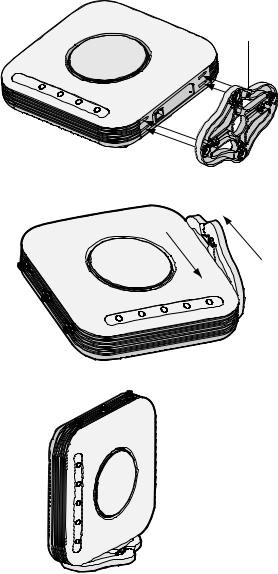
Fixation sur table
Pour installer le PA sur une surface plane, comme une table ou un bureau, procédez comme suit :
1Insérez les pattes du socle dans les encoches situées sur le côté du PA, comme illustré dans la figure. Alignez l'encoche de passage du câble vers la partie supérieure du socle.
Encoche de passage du câble
2Pour fixer le socle au PA, faites glisser le socle vers l'arrière et le PA vers l'avant, comme illustré dans la figure ci-dessous :
3 Placez le PA et le socle sur la table.
4Branchez le câble Ethernet pour l'alimentation et la connexion au réseau dans le port LAN situé au dos du PA.
16

4. Mise sous tension
Cette section explique comment mettre le PA sous tension au moyen des méthodes suivantes :
•Par PoE (Power Over Ethernet) assuré via le réseau local par le biais d'un dispositif PoE répondant à la norme 802.3af, tel qu'un commutateur.
•Par PoE assuré via un injecteur PoE ou midspan (non fourni avec le PA).
PoE (Power over Ethernet) via le réseau local
Pour alimenter le PA par le biais d'un commutateur ou autre dispositif répondant à la norme 802.3af, il suffit de brancher le câble réseau du dispositif au port Ethernet du PA.
Point d'accès
 Commutateur PoE
Commutateur PoE
Power over Ethernet via un injecteur PoE
Pour mettre sous tension le PA au moyen d'un injecteur PoE ou midspan (non fourni), procédez comme suit :
1Branchez le câble LAN d'un commutateur au port correspondant de l'injecteur PoE. 3Com recommande l'utilisation d'un injecteur PoE gigabit tel que le 3CNJPSE-GIG.
2Connectez un câble LAN entre le port Ethernet du PA et l'autre port LAN de l'injecteur PoE.
3Branchez l'injecteur PoE à une prise de courant avec mise à la terre. Consultez l'illustration.
Point d'accès
|
Commutateur |
Vers le point d'accès |
(non PoE) |
|

 Vers le commutateur
Vers le commutateur
17

5. Vérification des voyants lumineux
Lorsque le PA est sous tension, différents voyants s'allument pour indiquer les activités en cours, répertoriées ci-dessous :
|
|
|
Indicateur |
Couleur |
État |
Description |
|
|
|
Voyant 1 |
|
Éteint |
Pas d'alimentation |
|
|
|
|
|
|
|
|
|
|
(Alimentation/ |
Ambre |
Allumé |
Défaillance de l'unité centrale ou du |
|
|
|
Système) |
|
|
système |
|
|
|
|
Clignotant |
Initiation ou réinitialisation du système |
|
|
|
|
|
|
||
|
|
|
|
|
|
(autotest du système et chargement) |
|
|
|
|
|
|
|
|
|
|
|
Vert |
Allumé |
En marche et prêt à l'emploi |
|
|
|
|
|
|
|
|
|
|
Voyant 2 |
Vert |
Éteint |
Radio désactivée |
|
|
|
|
|
|
|
|
|
|
(2.4G) |
|
Allumé |
Radio activée |
|
|
|
|
|
Clignotant |
Activité |
|
|
|
|
|
|
|
|
|
|
Voyant 3 |
Vert |
Éteint |
Radio désactivée |
|
|
|
|
|
|
|
|
|
|
(5G) |
|
Allumé |
Radio activée |
|
|
|
(uniquement sur le |
|
Clignotant |
Activité |
|
|
|
point d'accès |
|
|
|
|
|
|
3Com AirConnect |
|
|
|
9550) |
|
|
|
|||
|
|
|
Voyant 4 |
|
Éteint |
Pas de lien 10/100/1000 BASE-T détecté ou |
|
|
|
(Ethernet) |
|
|
désactivation administrative |
|
|
|
|
|
|
|
|
|
|
|
Ambre |
Allumé |
Lien 10/100 BASE-T détecté ; pas d'activité |
|
|
|
|
|
|
|
|
|
|
|
|
Clignotant |
Activité au niveau du lien 10/100 BASE-T |
|
|
|
|
|
|
|
|
|
|
|
Vert |
Allumé |
Lien 1000 BASE-T détecté ; pas d'activité |
|
|
|
|
|
|
|
|
|
|
|
|
Clignotant |
Activité au niveau du lien 1000 BASE-T |
|
|
|
|
|
|
|
6. Installation du logiciel
L'application suivante figure dans le CD-ROM de l'utilitaire WIDMan de 3Com :
• Wireless Infrastructure Device Manager (Utilitaire WIDMan)
Pour être en mesure de détecter le PA, vous devez tout d'abord installer le logiciel Wireless Infrastructure Device Manager (WIDMan) sur votre ordinateur.
1Allumez votre ordinateur.
2Insérez le CD-ROM d'installation 3Com dans le lecteur.
Le menu du CD-ROM apparaît. S'il n'apparaît pas, vous pouvez le lancer à partir du menu Démarrer de Windows. Exemple : Démarrer> Exécuter > d:\autorun.exe
3Dans le menu, cliquez sur Install/Uninstall WIDMan.
4À l'écran suivant, double-cliquez sur 3Com Wireless Infrastructure Device Manager puis cliquez sur Install. L'installation commence.
5Suivez les instructions figurant sur chaque écran pour procéder à l'installation. Redémarrez l'ordinateur si vous y êtes invité.
18
7. Connexion au PA
Pour vous connecter au PA, vous devez tout d'abord déterminer son adresse IP au moyen d'une des méthodes suivantes :
Recherche de l'adresse IP sur un réseau équipé d'un serveur DHCP
Si votre réseau comprend un serveur DHCP, une adresse IP est automatiquement attribuée au PA. Il faut une à deux minutes au PA pour détecter la présence d'un serveur DHCP sur le réseau. Utilisez le logiciel WIDMan pour localiser le PA sur le réseau et afficher son adresse IP. Reportezvous à la section “Utilisation de l'utilitaire WIDMan”.
Recherche de l'adresse IP sur un réseau sans serveur DHCP
Si votre réseau ne comprend pas de serveur DHCP, le PA utilise une adresse IP par défaut (169.254.2.111).
Utilisation de l'utilitaire WIDMan
Le logiciel 3Com WIDMan (Wireless Infrastructure Device Manager) vous permet de détecter et de configurer le PA. Suivez la procédure ci-après pour déterminer l'adresse IP du PA à l'aide de WIDMan.
1Connectez le PA au réseau.
2Lancez WIDMan à partir du menu Démarrer de Windows : Démarrer > Programmes > 3Com Wireless > Wireless Infrastructure Device Manager. L'écran d'arborescence du réseau sans fil affiche le PA une fois qu'il est détecté.
3Cliquez sur votre PA pour le sélectionner puis sur Propriétés. Notez l'adresse IP du PA.
4Pour accéder à l'interface Web du PA, sélectionnez le PA puis cliquez sur Configurer ou double-cliquez sur le PA.
8.Configuration du PA
Pour configurer le PA après avoir déterminé son adresse IP, procédez comme suit :
1Démarrez le navigateur Web de votre ordinateur. Dans la barre d'adresse, entrez l'adresse IP de votre PA et appuyez sur la touche Entrée.
2À l'écran de connexion au PA, tapez le nom d'utilisateur et le mot de passe puis cliquez sur Log On. Le nom d'utilisateur et le mot de passe par défaut respectent la casse :
•Nom d'utilisateur : admin
•Mot de passe : password
3Lorsque vous vous connectez au PA pour la première fois, vous êtes invité à sélectionner le pays d'utilisation du dispositif. Choisissez votre pays dans le menu, puis cliquez sur Apply (Appliquer).
4Pour configurer le PA, cliquez sur Setup Wizard (Assistant d'installation) dans le menu situé à gauche.
19
